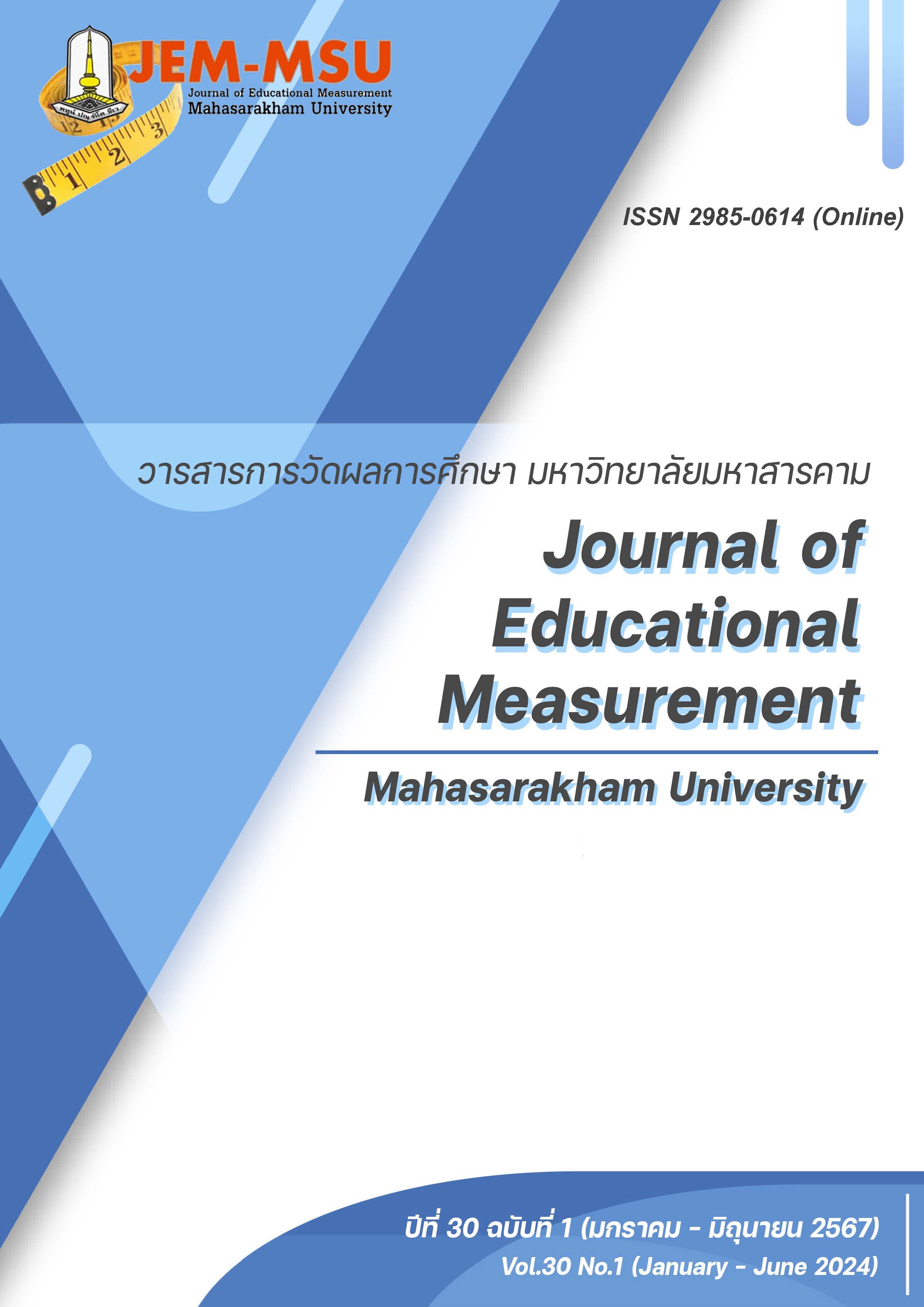A Learning Management Model to Enhance Reasoning Ability and Desirable Characteristics for a Course in Labor Law for Vocational Students
Main Article Content
Abstract
This research and development aimed to 1) develop a learning management model to enhance reasoning and desirable characteristics in learning labor law of vocational students and 2) to evaluate the developed learning model on using reasoning and desirable characteristics in studying labor law by applying the concepts Self-knowledge creation, reasoning, problem-based learning, and social learning theory. This research was action in the Faculty of Industrial Technology, Nakhon Phanom University and research process included phase 1 was developed model by interviewing 3 teachers, 9 students, also observing 3 labor law classes to assess problems and needs to develop a learning management model and drafting a learning management model according to the prior concepts and information, also quality assessed by 5 experts. Phase 2: Experimenting a model to assess reasoning abilities and desirable qualities in studying labor law subjects. A sample was 13 people enrolled by purposively selected. Research tools included the model outlines, learning plans, and assessments of reasoning and desirable characteristics forms. Data analyzing statistics were used including percentage, mean, and standard deviation, comparing increasingly mean and percentage of learning outcome scores and content analysis.
Research results: The learning management model components consisted of 1. concepts and principle basic theories 2. Objectives 3. Learning management processes 4. Social factors and responses 5. Supporting factors and learning resources 6. Quality assessment and the draft format appropriateness is a high level, and the development this learning management models was applied concepts of self-knowledge creation, reasoning, problem-based learning, and social learning theory, also average evaluated score for 4.3. The draft learning management model trial on enhancing reasoning ability and desirable characteristics in labor law for vocational students was averages scores for 29.6 and 54.4, and representing accounting for 65.9 and 67.9 percent, respectively. The criteria of rubrics scoring in the reasoning ability assessment have been clarified for clearly assessment and more appropriate. This learning model can be applied to students in relevant situations to be more successful and efficient.
Article Details

This work is licensed under a Creative Commons Attribution-NonCommercial-NoDerivatives 4.0 International License.
The content and information contained in the published article in the Journal of Educational Measurement Mahasarakham University represent the opinions and responsibilities of the authors directly. The editorial board of the journal is not necessarily in agreement with or responsible for any of the content.
The articles, data, content, images, etc. that have been published in the Journal of Educational Measurement Mahasarakham University are copyrighted by the journal. If any individual or organization wishes to reproduce or perform any actions involving the entirety or any part of the content, they must obtain written permission from the Journal of Educational Measurement Mahasarakham University.
References
Bandura, A. (1977). Social Learning Theory. Prentice Hall.
Blair, C. (2006). How similar are fluid cognition and general intelligence A developmental neuroscience perspective on fluid cognition as an aspect of human cognitive ability. Behavioral and Brain Sciences, 26, 109–160.
Bloom, B. S. (1976). Human Characteristic and School Learning. McGraw-Hill.
Cattell, R. B. (1971). Abilities: Their structure, growth, and action. Houghton Mifflin.
Ganzel, A. K. (1999). Adolescent decision making: The influence of mood, age, and gender on the consideration of Information. Journal of Adolescent Research, 14, 289–318.
Garofalo, J., & Kufakwami, M. D. (1992). Mathematics as reasoning. In T. E. Rowan & L. J. Morrow (Eds.), Implementing the K-8 curriculum and evaluation standards: Readings from the Arithmetic Teacher (pp. 16–18). National Council of Teachers for Mathematics.
Goswami, U. (1992). Analogical reasoning in Children. Lawrence Erlbaum.
Gotfredson, L. S. (1997). Why G matters: The complexity of everyday life. Ntelligence, 24,79 –132.
Joyce, B., Weil, M., & Showers, B. (2004). Models of Teaching (5th ed.). Prentice-Hall of India.
Holland, J. H. (1995). Hidden order: How adaptation builds complexity. Helix Books/Addison-Wesley.
Kauffman, S. (1996). The search for Laws of self-organization and complexity. Oxford University Press.
Kavanagh, M. (1990). Moral emotions, moral Ideals, moral education [Doctoral dissertation]. University of Alberta.
Kubiszym, T., & Borich, G. D. (1987). Educational Testing and Measurement (2nd ed.). Foresman.
McInerney, D. M. (2014). Educational psychology constructing learning (6th ed.). Pearson Australia.
Nitko, A. J., & Brookhart, S. M. (2011). Educational Assessment of Students. Pearson/Allyn & Bacon.
Piaget, J. (2001). The Psychology of intelligence. Routledge.
Robbins, J. K. (2011). Problem solving, reasoning, and analytical thinking in a classroom environment. The Behavior Analyst Today, 12(1), 41–48.
Sadler, T. D. (2004). Socioscientific Issue Research and Its Relevance for Science Education. www.eric.ed.gov
Schunk, D. H. (2012). Learning Theories. An Education Perspective (6th ed.). Allyn & Bacon.
Sternberg, R. J. (2003). Four alternative futures for education in the United State: It's our choice. School Psychology Quarterly, 18(4), 431–445.
Vygotsky, L. (1978). Mind and Societ. In The Development of higher psychological process. Edited by Michael Cole, Vera John-Steiner, Sylvia Scribner, and Ellen Souberman. Haward University Press.
Whitney, D. R., & Sabers, D. L. (1970). Improving Essay Examinations III, Use of Item Analysis,Technical Bulletin II, University Evaluation and Examination Service. The University of Lowa.
Zohar, A., & Nemet, F. (2002). Fostering Students’ Knowledge and Argumentation Skills through Dilemmas in Human Genetics. Journal of Research in Science Teaching, 39(1), 35–62.
Paungmalit, P. (2016). Desired characteristics of law students in training experience. Suan Dusit University. (in Thai)


